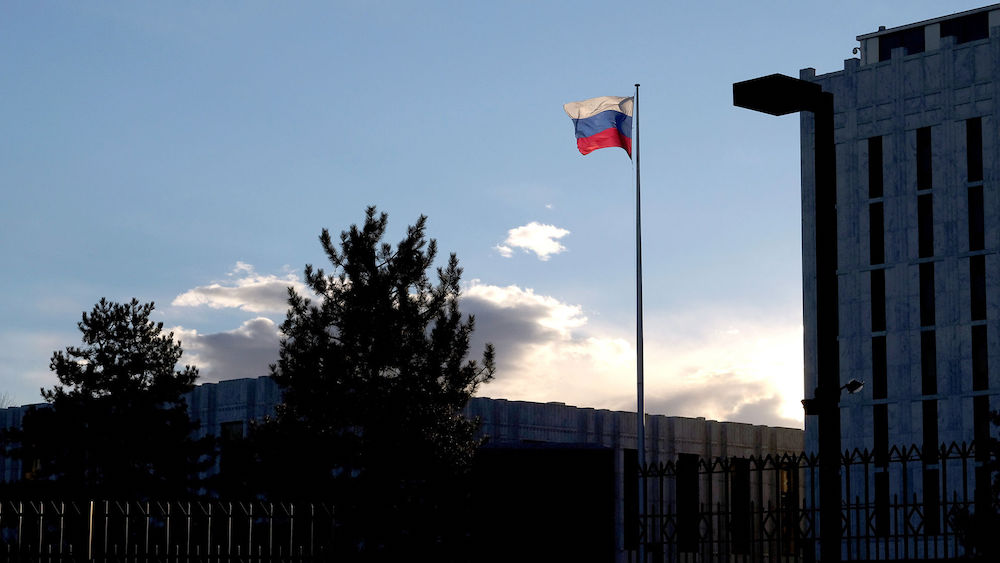Russia’s Internet offensive against the West isn‘t exactly new. The Kremlin has been using the very same tactics on the Russian opposition for years.
Around the time of the annexation of Crimea in March 2014, Russia’s leadership came to a pivotal conclusion: They had the resources and opportunity to directly influence politics in the West. That spawned a campaign to support and create influential political organizations in Europe with financial and political aid from Moscow. The ultimate aim was to put the United States and the European Union under pressure, and to help elect European governments that would recognize the annexation of Crimea as legal – just as France’s right-wing populist candidate Marine Le Pen recently did in an interview with CNN. Legitimizing Russia’s move in Crimea would mean a step toward lifting sanctions, after all.
The Kremlin’s strategy swung into gear at the height of Europe’s migration crisis in 2015. Extremist and populist parties gained traction with anti-immigration messages, planting the seeds of skepticism and doubt concerning the EU – and Moscow stood behind them. It was opportunistic but successful. Nationalist movements that were once considered fringe groups made significant strides in some EU countries, threatening to undermine the European project.
Russia made no secret of its support for Donald Trump in the US elections either. President Vladimir Putin publicly heaped compliments upon Trump; before his brief time in office, National Security Adviser Michael Flynn was paid handsomely to speak at a 2015 RT (formerly Russia Today) dinner, where he was seated next to Putin; at the Russian Embassy in Washington, staffers reportedly met with members of Trump’s campaign team. The most brazen act, however, came when hackers linked to Russia’s secret service intercepted the Democratic National Committee’s email servers, targeting Hillary Clinton and campaign chairman John Podesta and flooding the media with compromising material.
Russia’s IT industry is hardly considered advanced, but these hackers were highly skilled. Using them is part of a larger strategy to build a powerful tool that allows the Kremlin to wield great influence and quash opposition. In a country where censorship is increasingly commonplace, social media and video blogs alone offer the opposition a platform to expose corruption and cronyism. It is no wonder, then, that Moscow is increasingly clamping down on Internet freedoms. The government has used a sweeping anti-terrorism law to massively expand the legal framework of what is allowed and curtail civil society and political engagement online. In June 2016 a new law was passed that forces mobile phone operators to store the calls and text messages of Russian citizens, and security authorities can request access to encrypted correspondence. The Kremlin also has an array of tools at its disposal to block dissident websites, all without judicial oversight.
Deepening Persecution
Meanwhile, the state’s persecution of its opponents has deepened. The Russian supervisory body for telecommunications, Roskomnadzor, has blocked several opposition sites, including the Internet newspaper Grani.ru and Kremlin critic Alexei Navalny’s blog on LiveJournal. Activists regularly face criminal charges for their own comments on social media, and even for reposting what others have shared. Some of the accused are sentenced to volunteer in the community; others end up behind bars.
The government wastes no chance to tighten its grip on social media. Pavel Durov, founder of Russia’s largest social networking site VKontakte, says he was fired, forced to cede his company to Putin’s close ally, Igor Sechin, and flee the country. Since then, state media have repeatedly published opposition activists’ private contact information from VKontakte in a bid to discredit them.
The chief ideologist behind the Kremlin’s online strategy is Putin’s Internet adviser, German Klimenko. He has argued in favor of banning foreign social media from Russia entirely and has threatened to block Telegram, Durov’s popular messenger service, because the company refused to move its servers to Russia.
It is important to remember that Russian leadership believes Washington controls the Internet. Putin was quoted in 2014 as saying: “The Internet started as a CIA project and continues to develop as one.” He has promised to invest more in Russian IT companies.
Russia’s obstruction of the Internet has hobbled the country’s IT industry; many of its brightest minds leave the country to find success abroad. Russian Internet companies are so strictly regulated that they struggle to keep up with international competitors. At the same time, a state-sponsored IT industry has emerged. The secret service is working to bring more IT specialists on board. Some are won over by money, while others are forced to work for the state or face criminal charges.
According to a study conducted by Zecurion Analytics, a company that analyzes the global role of cybersecurity in defense budgets, Russia is among the top five countries in cyber spending, along with the US, China, the UK, and South Korea. China’s “hacker army” costs Beijing around $1.5 billion a year and counts some 20,000 “cyber soldiers.” The UK employs 2000 people in cybersecurity and spends $450 million. South Korea invests $400 million in about 700 people, while Russia’s program cost $300 million and employs around a thousand people.
Opposition as Guinea Pigs
The very technology that has driven innovation in the West has been used to quell dissent in Russia, helping the Kremlin collect information on individuals and organizations, vilify independent politicians, and launch politically-motivated investigations against critics.
In 2011 and 2012, the Gmail accounts of both Navalny and his wife were hacked and years of private email correspondence went public. Navalny says around ninety percent of the emails were genuine while some ten percent were fabricated. It was the start of a large-scale campaign to undermine Navalny. State media networks featured daily programs picking apart Navalny’s emails to colleagues, employees, friends, and family, with Kremlin-friendly experts providing analysis. It was a brazen attempt to slander Russia’s best-known opposition politician.
The hacker attack behind Navalny’s email leak clearly violated his right to privacy, which is protected under the Russian constitution. But authorities argued Navalny was being investigated for his communications with an advisor, Nikita Belykh, governor of the western Kirov Oblast. Their communication caught the eye of investigators and led to trumped-up charges of embezzlement. Navalny was found guilty and lost his right to run for office. The European Court of Human Rights criticized the ruling as arbitrary, and it was later annulled.
The spokesman for the Investigative Committee of the Russian Federation Vladimir Markin went so far as to admit that Navalny’s conviction was political: “Politics certainly play a role in these proceedings, and it has to do with the defendant. He is trying with all his might to attract attention and provoke the power of the state,” Markin said in an interview.
Andrey Pivovarov, an opposition leader in St. Petersburg, recently saw his account on VKontakte’s messenger service hacked. His emails, too, were analyzed in great detail on state TV, and his criticism of other opposition activists, expressed in private, were published shortly before a large demonstration. It was a bold-faced plot to divide Russia’s protest organizations and demoralize their supporters.
A Hybrid War
The strategy worked so well against its own opposition that Moscow started to employ it further afield for geopolitical gains. The emails won from the US Democratic National Committee hack were handed over to WikiLeaks; after the election, US intelligence agencies made public their conclusion that the attacks were carried out at the behest of Russian leadership, with direct orders from Putin.
Of course, Russia’s secret service was not entirely responsible for the outcome of the US election. Donald Trump’s shock victory was rooted in the intrinsic ills roiling American society. In fact, Putin probably did not expect that Trump would actually win. There is, however, no doubt that the Kremlin attempted to interfere in the campaign.
Putin is pursuing a type of hybrid warfare with the West. Attacks are carried out under the cloak of secrecy and encryption so the Kremlin can officially distance itself from illicit activities. Putin believes that by demonstrating his power to the West, their governments will become more accommodating.
The US has maintained its sanctions on Russia and stepped up rhetoric, but that has done little to bring an end to the Kremlin’s manipulation. In France, Russia’s secret service supported Marine Le Pen and used strategies learned from the US election campaign to target pro-European centrist Emmanuel Macron. He has been critical of Russia, and in February 2017 Macron’s aides accused Russia of repeatedly attempting to hack their candidate and his En Marche! movement’s website.
Humpty Dumpty
For the Kremlin, hacker attacks are one of the most efficient ways to undercut opponents; Western countries are still struggling to identify the best way to counter attack. The Obama administration expelled 35 Russian diplomats before leaving the White House, imposing sanctions on high-ranking Russian intelligence agents and their private IT companies as well.
But this Kremlin strategy has backfired. Factions within the government have employed hackers to win the upper hand in internal power struggles. In 2014 the prominent Humpty Dumpty group leaked information to the public about Russian officials and state ministries. Prime Minister Dmitry Medvedev, his deputy Arkady Dvorkovich, Putin adviser Vladislav Surkov, and Timur Prokopenko, a high-ranking official in the Kremlin’s interior administration, were all targeted.
The leaked information blew the cover off the government’s corruption and rampant abuse of power, and Humpty Dumpty was promptly branded as opposition. Yet in 2016 it emerged that the hackers were connected to the FSB intelligence service, which acted, according to the hacking group, as a “handler.” Nearly every member of the group was arrested during the investigation, including Sergei Mikhailov, the deputy head of the agency, and Dmitry Dokuchaev, another FSB officer.
Humpty Dumpty aside, there has been much hand-wringing in the West over how to counter Russian cyber attacks. It is important to accept that almost every message sent online can be made public. The Russian opposition has long since come to the conclusion that the only effective way to protect itself is maximum transparency – in other words, do not send anything in an email you would not be willing to repeat in public. It is a strategy that only goes so far, however. If the Kremlin no longer has access to incriminating material to ruin opponents, it will simply fabricate news.
Read more in the Berlin Policy Journal App – May/June 2017 issue.








